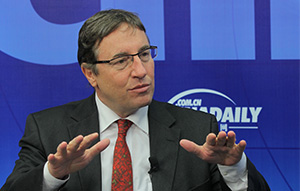China signals readiness for deeper reforms
Updated: 2013-11-13 15:32
(Xinhua)
|
|||||||||||
BEIJING -- The just-concluded plenum of the Communist Party of China (CPC) sent a firm signal to the global community that the world's second largest economy will carry out comprehensive and deeper reforms, say overseas experts and media.
At the close of the Third Plenary Session of the 18th CPC Central Committee on Tuesday, a decision was approved on "major issues concerning comprehensively deepening reforms", according to a communique issued after the meeting.
Giuliano Pisapia, mayor of the northern Italian city of Milan, told Xinhua that he believes the decision "outlines a commitment on the market, the green economy and the ability to handle competition with a positive perspective, which means for example avoiding situations of monopoly," he said. "I have read (the statement), and I really appreciated the decisions of the plenum."
Joe Foudy, a business professor at New York University, said China's economic reforms would be "quite transformative" for the country.
"These reforms are really the most important reforms that we've seen since the 1990s... This is a real opportunity to try to move China decisively towards markets," he said.
Foudy reiterated the need to deepen reforms, or the country would likely "hit a growth wall".
"I think the Chinese government is well aware of that so I think there is a clear consensus on a need for reform," he said. "I think China has always been incremental in its reforms and I expect that to continue."
Meanwhile, media reported on the key reforms and potential challenges, with some predicting more announcements to come.
In an article entitled "China Pledges 'Decisive' Reform", the Financial Times said the CPC will carry out decisive reforms in key sectors by 2020.
The market is playing a more and more important role in the allocation of resources, yet the State-owned economy still remains dominant, the British newspaper said. The report went on to say it is expected that Chinese leaders will reveal more economic reforms following the four-day meeting, such as currency and interest-rate liberalization, and the development of China's modern agriculture.
Reuters reported on the CPC meeting in an article entitled "China Promises to give Markets 'Decisive Role' in Economy", saying that China's control on economic sectors will gradually loosen, and private sectors and foreign companies would probably have a better environment in which to develop.
The Shanghai Free Trade Zone is believed to be a test field for China's key reforms, it said, though added that reform will face challenges from groups with an interest, such as local governments and state-owned companies. A BBC reporter also spoke of the potential challenges, saying that the next step for the Chinese leadership will be to persuade local officials to change and implement policies.
As with the Financial Times article, the Reuters piece predicted more details will be announced in the coming days or weeks, adding that it will take time to be able to judge the significance and impact of the meeting, and the level and effect of the reforms initiated.
Meanwhile, Singapore's leading newspaper, The Straits Times, published a report headlined "Free Markets to play 'Decisive' Role in China", noting that the country's ruling elite have pledged to let free markets play a "decisive" role in the state-dominated economy -- a sign that further liberalization is on the cards in the next decade as the leadership aims for better-quality growth.
Chief among the reform pledges was a vow to "give markets a decisive role in resource allocation and give better play to the role of government" in the world's second-largest economy, it said.
The newspaper pointed to another highlight of the meeting being the announcement of the establishment of a state security committee to consolidate policymaking decisions relating to China's domestic and foreign security challenges.
The CPC also promised freer investment flows and the setting up of more free trade zones in the mould of the Shanghai Free Trade Zone launched in September as a test bed for the new leadership's economic restructuring efforts, the report said.
Related Stories
China on new starting point of reform after key plenum 2013-11-13 11:17
China's reform plan 'extremely positive': WB 2013-11-13 11:16
Leadership charts path 2013-11-13 02:03
Fiscal system tackles local debts 2013-11-12 21:35
China vows ecological protection: communique 2013-11-12 20:26
China to build law-based, service-oriented govt 2013-11-12 19:20
Today's Top News
China, EU 'to launch investment treaty talks'
Leadership charts path
Security body to be set
Obama's legacy at stake in Iran nuclear talks
US and China should focus on the 'big picture'
Survey: Chinese workers just not engaged
Guangzhou limits vehicles on road to ease pollution
Renewable energy to steam ahead
Hot Topics
Lunar probe , China growth forecasts, Emission rules get tougher, China seen through 'colored lens', International board,
Editor's Picks

|

|

|

|

|

|





